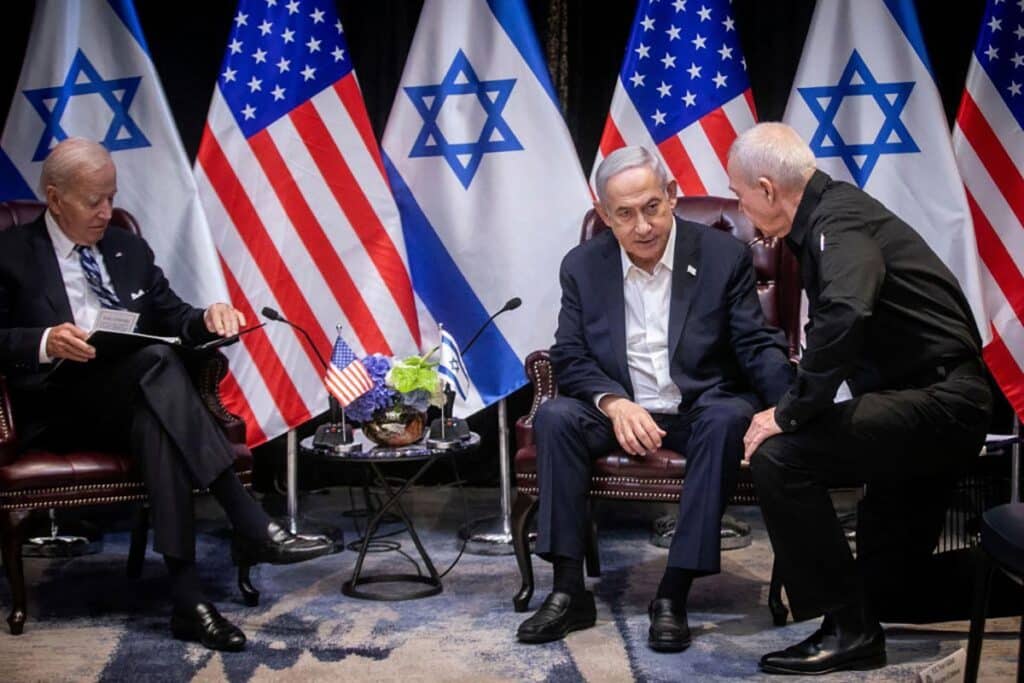
Prime Minister Benjamin Netanyahu announced that he fired Defense Minister Yoav Gallant on Tuesday evening after months of disagreements between the two.
Current Foreign Minister Israel Katz will replace Gallant as defense minister, while MK Gideon Sa’ar, who recently joined the coalition, will replace Katz as foreign minister.
The move sparked an uproar both in Israel and around the world as the future of the war and government in Israel became much less clear.
How did we get here?
Netanyahu and Gallant have been at odds even before Oct. 7.
When the government attempted to approve a controversial judicial reform plan in March 2023, Gallant made a public statement opposing how the legislation was being handled and warning of its possible repercussions on national security.
In response, Netanyahu announced he would fire Gallant, but backed down after nationwide protests erupted against the decision.
Throughout the war, Gallant and Netanyahu have been at odds, both about political issues and the war’s handling.
For one, Gallant had called for the opening of a state commission of inquiry into the circumstances surrounding the Oct. 7 attacks, while Netanyahu has opposed the launch of any investigation until the war is over.
Gallant was also somewhat more aligned with the Biden administration when it came to handling the war, pushing for the determination of a clear strategy concerning the administration of Gaza post-Hamas. Netanyahu, on the other hand, insisted that a full strategy could only be formed once the war was over.

On other issues, the alignment was reportedly opposite, with Netanyahu aligned more closely with the U.S. and Gallant opposed. For example, the former defense minister reportedly pushed for more decisive action against Hezbollah earlier in the war, despite opposition from the Biden administration, while Netanyahu wanted to wait.
In recent weeks, another issue has become more central: the conscription of Haredim to the IDF.
In Israel, all citizens are legally required to register for the draft at the age of 18, though not all are ultimately drafted into the military due to various exemptions. Despite not fitting into these exemption categories, Haredi full-time yeshiva students receive a blanket exemption by declaring that “Torah study is his work.”
This blanket exemption has become more controversial over the years as tens of thousands of young men now use it to avoid the draft. The controversy came to a boiling point during the war after the government announced it would dramatically increase the number of days reservists would need to serve each year due to a manpower shortage.
Several years ago, the High Court of Justice ruled that the arrangement was unconstitutional and would need to be replaced, but so far, a new law hasn’t been passed. Earlier this year, the government’s grace period ended, technically meaning that the IDF is now required to draft Haredi young men like any other Jewish Israeli.
In light of this, judicial officials ruled that a daycare subsidy currently provided to young Haredi fathers is illegal unless they draft.
In response, the Haredi parties in the Knesset have threatened to topple the government and spark elections unless the blanket exemption and the daycare subsidies are restored.
Other politicians, including both members of the coalition and the opposition, have expressed stark opposition to restoring the blanket exemption, insisting that everyone needs to help “carry the burden” of military service.
Gallant was one of the main members of the government who opposed restoring the draft exemption. In his position as defense minister, he also authorized the IDF to send 10,000 draft orders to Haredi young men over the past few months, although the vast majority of those who received orders have refused to show up.
Netanyahu, on the other hand, has attempted to promote the restoration of the blanket exemption in order to avoid the collapse of the government.
On Tuesday evening, Netanyahu announced that he had decided to fire Gallant due to “significant gaps” between the two concerning the management of the war and a breakdown in trust between the two. The prime minister stressed that Gallant’s statements and actions had contradicted the decisions of the government and the security cabinet.
Netanyahu accused Gallant of leaking their disagreements to the press and Israel’s enemies, saying, “Our enemies took pleasure in this and benefited greatly from it.”
What will Gallant’s firing mean for the war?
It remains unclear how exactly Gallant’s firing will affect the war.
While Gallant was seen as more of a moderate voice in terms of the future of the Gaza Strip, he was seen as more of a war hawk when it came to Lebanon and Iran.
In a speech after his dismissal on Tuesday, Gallant said that a central part of his firing was his support for a hostage deal. His dismissal may mean the government will abandon or further diminish ongoing efforts to reach a ceasefire and hostage release deal.
Relatives of the hostages still held in Gaza expressed concerns about this development on Tuesday. The Hostages and Missing Families Forum warned that Gallant’s dismissal was a “direct continuation of the ‘efforts’ to torpedo the hostage deal.” The Forum insisted that the military goals of the war in Gaza had been achieved and that a ceasefire deal was now needed to release the hostages.
U.S. officials told Israeli media that the decision to fire Gallant was “concerning,” adding that they had “real questions about the reasons for Gallant’s firing and about what is driving the decision.”
Israeli media also reported that Netanyahu is now considering firing IDF Chief of Staff Herzi Halevi and other leaders of the Israeli defense establishment, although Netanyahu’s office denied the reports. Swapping the heads of the defense establishment at this moment could disrupt the war effort as well.
Questions have also been raised concerning Katz, who is set to replace Gallant. Katz doesn’t have significant experience in the defense establishment and hasn’t yet expressed clear positions on how the war should be handled.
What will Gallant’s firing mean for the government?
While removing Gallant as defense minister means getting rid of his say on government decisions, he still is a member of Knesset, meaning he’ll still have a vote on the draft exemption law and the daycare subsidy law.
In addition, Gallant isn’t the only member of the government or coalition opposed to these laws.
With the addition of Sa’ar, the coalition led by Netanyahu currently has 68 seats in the 120-seat Knesset. Netanyahu needs at least 61 coalition members to support the bills for them to pass, meaning that if seven or more members are opposed, the bills will fail.
If the bills fail to pass, the Haredim have threatened to topple the government. One way they may do so is by not supporting the national budget.

Every year or, at most, two years in Israel, the government has to approve a new national budget. If a budget isn’t passed by Dec. 31, the government enters the new year with an identical budget to the previous year, but is mandated to only spend 1/12 of that total per month. If the inability to pass a budget continues until March 31, the Knesset automatically collapses and elections are called.
The budget itself is also stirring controversy in Israel, with several MKs warning they won’t vote in favor when it comes before the Knesset.
The budget currently on the table includes several measures that will raise taxes, while also reducing or maintaining the budgets of several ministries. The police and National Security Minister Itamar Ben-Gvir have expressed outrage that the police didn’t receive a larger budget this year, with Ben-Gvir’s party — which includes six MKs — saying it plans to vote against the budget.
Culture and Sports Minister Miki Zohar also voted against the budget in the government, although it remains unclear if he’ll vote against it in the Knesset as well.
Removing Gallant may have helped Netanyahu deal with some of the obstacles standing in the way of the government’s survival, but there are still many more issues on the table. How exactly the government will deal with those challenges remains uncertain.


